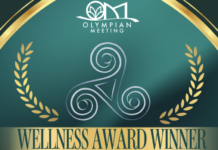Wellness event architect David T. Stevens on how
movement, mindfulness, meaning and meals can foster
attendee engagement and positive outcomes.
A piecemeal approach to wellness at meetings is no longer enough, says David T. Stevens, PMED, co-founder of Olympian Meeting, host of the Web series Return on Wellness and speaker at Prevue’s upcoming Meet Well Summit in August. Stevens is passionate about the benefits of a holistic approach. Prevue recently caught up with him to ask about going beyond the yoga mat at meetings, and why it is essential for ROI. “At the heart of any successful event lies the potential to not only gather insights and knowledge but also to enrich and energize attendees through well-integrated wellness practices,” he says. And, there’s a bottom line imperative. “Taking care of attendees by implementing wellness practices pays off in a massive return on investment. When attendees leave an event energized from nourishing food, movement and meaningful engagement—and not exhausted from being run into the ground— they GUSH in the surveys.”
Wellness “has had a watershed moment and moved into our daily lives,” notes Stevens. “It’s no longer a ‘nice to have’ or a ‘luxury’ for meetings. It is an absolute requirement. I think the biggest thing when it comes to wellness is that it must be intentionally done and given the room to succeed.”
Stevens cites four foundational pillars of wellness: movement, mindfulness, meaning and meals. Movement involves all aspects of physical engagement throughout the event’s duration. True mindfulness encompasses the entire attendee experience, not just meditation. Meaning is about connecting attendees to a purpose larger than themselves. Meals at meetings should not only satisfy dietary needs but also support cognitive function and overall satisfaction. Stevens advises planners to include practices from each pillar into the event program. Among his recommendations:
Movement
• Engaging in high-intensity cardio workouts, such as HIIT or bodyweight boot camps, can dramatically enhance capillary health and expand the hippocampus—the brain area associated with learning and memory.
• However, movement at events isn’t limited to structured exercise sessions. It encompasses all aspects of physical engagement, including meeting space layout. By setting up soft seating areas, classroom spaces and standing desks, event planners can cater to attendee preferences and allow them to choose their optimal learning environment. Strategically placed seating arrangements such as communal high tables or more casual lounge areas, can foster an inclusive environment where every participant feels valued and engaged.
• Smart program scheduling, like ensuring the meeting allows attendees time to access fitness facilities, can be cost-effective and impactful.
Mindfulness
• Mindfulness can transform meetings and events, but too often it gets boiled down to just meditation. Meditation is a component, but true mindfulness encompasses the entire attendee experience.
• Mindfulness involves thoughtful consideration of the schedule. It’s about the timing and duration of sessions, providing ample opportunities for networking and respecting how people absorb information. We shouldn’t expect attendees to remain engaged through a 60-minute keynote, for example. Why not break it into three 20-minute segments with cliffhangers to keep the audience engaged?
•Everyone learns differently, and giving attendees the space to connect and reflect on their experiences is crucial.
Meaning
• Incorporating meaning into meetings is more than just a feel-good add on. It’s a strategic approach that can heighten engagement, foster teamwork and leave a lasting impression on participants.
•Two foundational components of purposeful meetings are volunteerism and environmental stewardship.
• Boundless possibilities for meaningful activities range from helping to build schools to volunteering in community projects. These experiences allow participants to connect deeply with their destination, leaving it a little better than they found it.
Meals
• Incorporating thoughtful, inclusive catering choices can significantly enhance the attendee experience. Provide a variety of choices. Imagine a menu where attendees can choose from pasta salad or green salad, grilled chicken or saucy ribs, and for dessert, whole fruits or cookies. The idea is to cater to all preferences, ensuring everyone can eat as they like without feeling restricted. It’s possible and advisable to diversify the menu, even for large banquets.
• Offer meals that enhance cognitive engagement. Research suggests that a high-protein breakfast can improve focus, particularly for individuals with ADD or ADHD.
• Provide low-sugar mocktails and smoothies. Balance smoothies with protein options and consider displaying their macronutrient content. It’s a transparent and thoughtful way to help attendees make informed choices that align with their health goals.
You May Also Be Interested In…
2024: The Year of Event & Travel Wellness
IMEX America 2023: Yes, it is Possible to Be Healthy at a Giant Trade Show
Prevue Exclusive: Janice Cardinale on PES and How to Recover Emotional Health











